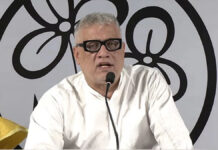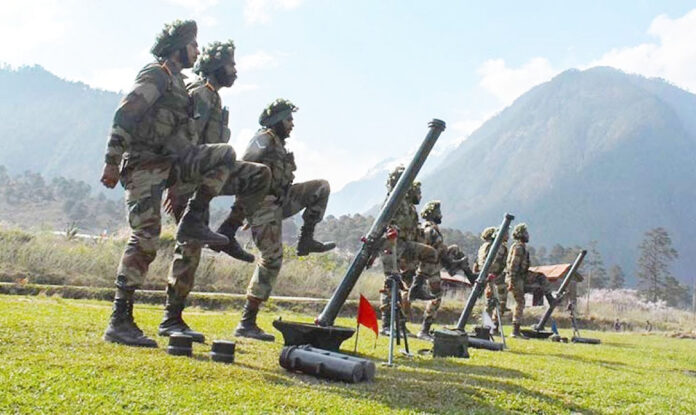NEW DELHI, Feb 9
The rapid evolution of military technology demands constant adaptation from armed forces. While historical advancements like swords, chariots, muskets and tanks developed over millennia, the past two decades have witnessed an unprecedented surge in technology like hypersonic missiles, AI-powered systems, unmanned aerial vehicles, direct energy weapons, cyber warfare, advanced communications, analytical systems and mapping technology. This “revolution in military affairs” (RMA) presents both opportunities and challenges, demanding a paradigm shift in military thinking and leadership development.
Developing nations like India however, face unique hurdles in embracing this change. Budgetary constraints are one obstacle, but a more critical challenge lies in the limited understanding of the RMA’s impact among political and military leaders. This lack of comprehension stems from the absence of a robust strategic thought ecosystem in India. Unlike major powers, India lacks a dedicated mechanism for training its civil and military officials in strategy, geopolitics, and warfighting. Existing institutions like the National Defence College (NDC) lack sufficient civilian representation and meaningful university partnerships. Additionally, a proliferation of think tanks, frequently funded by government bodies, can struggle with maintaining intellectual independence, potentially compromising creativity and critical thinking.
The Kargil Review Committee, recognising this gap, recommended establishing the Indian National Defence University (INDU), also referred to as (IDU), in 1999, endorsing a concept which was first proposed by the Chiefs of Staff Committee in 1967. Envisioned as a world-class institution, the INDU aimed to:
• Unify military education thereby bringing together diverse military training institutes under one umbrella, fostering jointness and doctrinal unity.
• Bridge the civilian-military divide through engagement with universities and think tanks to promote interdisciplinary research and collaborative learning.
• Shape strategic thinking by promoting research on emerging threats, technology trends, and the evolving security landscape, providing informed guidance to policymakers and military leaders.
Former Prime Minister Manmohan Singh laid the foundation stone for the INDU in 2013, outlining a vision for a prestigious institution, with the president as visitor and the defence minister as chancellor. The university was to have a diverse student body, with 66% from the armed forces and 34% from other government agencies. The initial wave of excitement surrounding the INDU project, particularly after the PM’s foundation stone laying ceremony, has waned considerably. In 2016, a draft INDU Bill was put online for public consultation and revised in 2017. Thereafter, the bill moved between the cabinet secretariat, ministry of defence and the armed forces.
Progress remained frustratingly slow—there is no official information available on the current status of the bill leaving many stakeholders puzzled and concerned. While some hint about internal power struggles between the military and bureaucracy vying for leadership positions, others point to the recent establishment of a separate National Defence University in Ahmedabad with a different focus. What is truly perplexing is the apparent inaction from the usually highly functional BJP government, especially considering the project’s potential impact on national security.
The lingering ambiguity surrounding the INDU project raises serious concerns, particularly in light of impending reforms in higher defence management. The proposed introduction of theatre commands necessitates a significant leap towards jointness and synergy amongst the armed forces and other government agencies. Here, the INDU, envisioned as a forerunner of jointness and strategic excellence, could have played a pivotal role in facilitating these crucial reforms.
Whatever the reasons, the delay is detrimental to India’s national security interests. The existing system, siloed within service-specific campuses, lacks the doctrinal unity and scholarly rigour needed for modern warfare. The government therefore owes the nation a clear explanation for the delay in implementation of this critical project.
Way forward
The government must expedite the creation of a truly world-class INDU by removing bureaucratic hurdles and resolving existing impediments. It is crucial to swiftly clear the pending bill and commence construction without further delay. A transparent timeline for the University’s completion and course commencement is necessary to ensure accountability. If inter-agency rivalries threaten to impede progress, the PM’s direct intervention could be instrumental in establishing a collaborative framework and guaranteeing the INDU’s smooth establishment and operation.
In case the government is considering altering the INDU project timeline or abandoning it to pursue alternative approaches, it must transparently communicate its intentions and provide a clear update on the project’s current status. If such changes are necessary, concrete replacement mechanisms must be defined to address the crucial need for joint strategic training and research in India’s defence sector. Delaying or altering course without clear explanation and viable solutions undermines trust and creates uncertainty about the future of this critical initiative.
Whatever be the framework of this university, it must come up as an autonomous institute of higher education with freedom to research and innovate. It must have a healthy mix of defence experts, policemen, bureaucrats, diplomats, academicians and entrepreneurs in the management and faculty with clear mandate to make it a centre of academic excellence.
Successful establishment of a fully empowered INDU will not only be a critical step towards addressing the strategic deficit but also serve as a powerful symbol of the Indian strategic establishment’s maturity, demonstrating its ability to foster collaboration amongst various agencies of the government for the nation’s future security.
The strategic community of India eagerly awaits the realisation of the INDU, anticipating its transformation into a vibrant hub of strategic thought. It also envisions INDU contributing meaningfully to the international community, solidifying India’s role as a thought leader in the contemporary world.



























